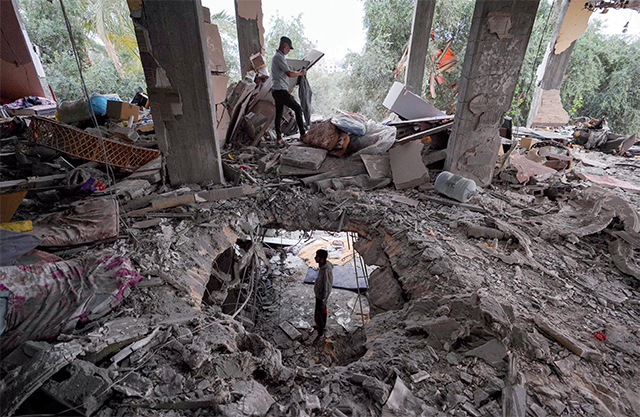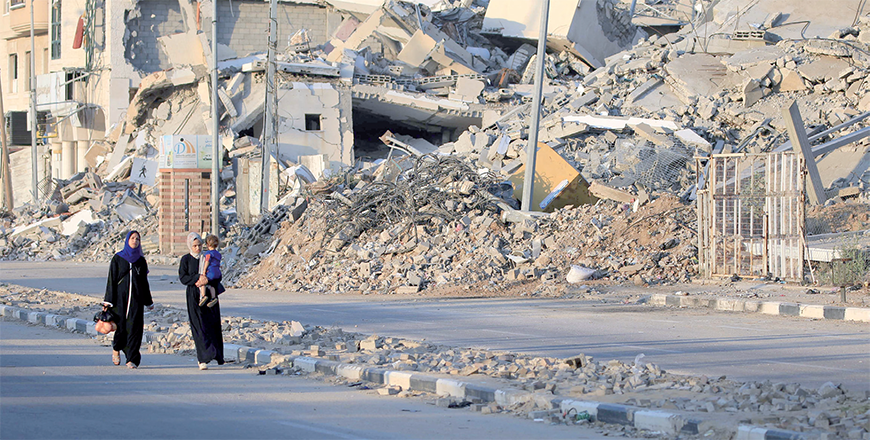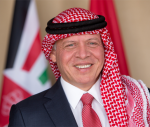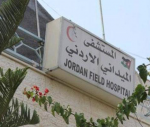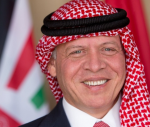You are here
Mediators work for halt to deadly fighting in Gaza
By AFP - Feb 01,2024 - Last updated at Feb 01,2024
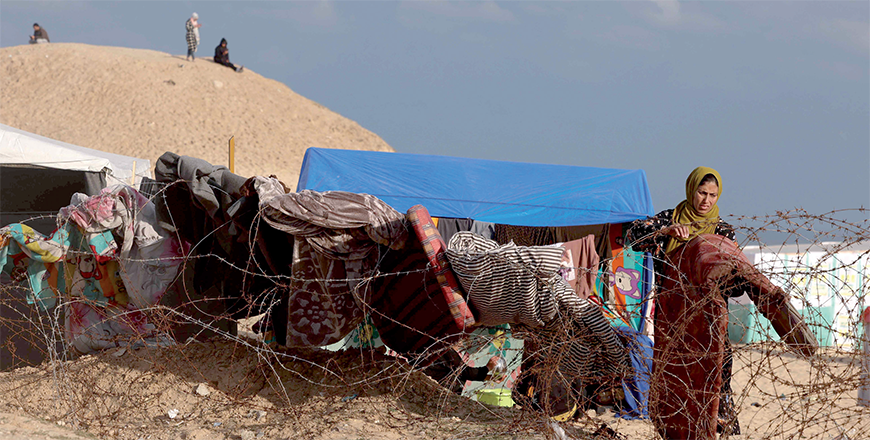
Palestinians go on with their lives at a makeshift camp set up on the beach for people who fled to Rafah in the southern Gaza Strip on Thursday (AFP photo)
The Qatar-based leader of Hamas Ismail Haniyeh was expected in Cairo on Thursday or Friday for talks on a proposed truce.
The group was reviewing a proposal for a six-week pause in its war with Israel, a Hamas source told AFP, after mediators gathered in Paris.
In Gaza, there was no let-up in fighting or aerial bombardment, with the current focus of combat in Khan Yunis, where Israel says leading Hamas fighters are hiding.
Overnight, witnesses said several Israeli air strikes hit the city, while aid and health workers have for days reported heavy fighting, particularly around two hospitals.
According to the health ministry in Gaza, 119 people were killed in the latest night of strikes.
"There is a massacre taking place right now," said Leo Cans of international aid group Doctors Without Borders.
Israel accuses Hamas of operating from tunnels under hospitals in Gaza and of using medical facilities as command centres, a charge denied by the Islamist group, which is designated a “terrorist” organisation by the European Union and the United States.
Due to constraints on the delivery of humanitarian aid, the population is “starving to death”, the World Health Organisation’s Emergencies Director Michael Ryan said on Wednesday.
“The civilians of Gaza are not parties to this conflict and they should be protected, as should be their health facilities,” he added.
In its latest update, the UN reported heavy bombardment across the Gaza Strip, particularly in Khan Yunis, while it said 184,000 more Palestinians from the city had registered to receive humanitarian assistance after fleeing their homes in recent days.
Three-stage plan
As Qatari and Egyptian-led mediation efforts intensified, Haniyeh was due in Cairo to discuss a truce proposal thrashed out in Paris last weekend with CIA chief William Burns.
A Hamas source told AFP the three-stage plan would start with an initial six-week halt to the fighting that would see more aid deliveries into the Gaza Strip.
Only “women, children and sick men over 60” held by Hamas fighters would be freed during that stage in exchange for Palestinian prisoners in Israel, the source said, requesting anonymity due to the sensitivity of the talks.
There would also be “negotiations around the withdrawal of Israeli forces”, with possible additional phases involving more hostage-prisoner exchanges, said the source, adding that Gaza’s rebuilding was also among issues addressed by the deal.
Following the deadliest attack in Israel’s history on October 7, its military launched a withering air, land and sea offensive that has killed at least 26,900 people in Gaza, most of them women and children, according to the health ministry in the Hamas-run territory.
The UN Conference on Trade and Development said tens of billions of dollars would be required to rebuild Gaza, which “currently is uninhabitable” as half its structures are damaged or destroyed.
Aid access
Israeli prime minister Benjamin Netanyahu has ruled out withdrawing troops from Gaza and has repeatedly vowed to destroy Hamas in response to the October 7 surprise attack.
Netanyahu has also opposed releasing “thousands” of Palestinian prisoners as part of any deal.
With scores of Israeli hostages still trapped in Gaza, there has been mounting criticism of Netanyahu’s government that has triggered street protests and calls for an early election.
For people in Gaza, access to aid has been further hampered by a controversy surrounding the UN agency for Palestinian refugees, UNRWA, after Israel accused several of its staff of involvement in the Hamas attack.
The claims last week saw several donor countries, led by key Israel ally the United States, freeze funding for the agency.
United Nations chief Antonio Guterres told a UN committee he had “met with donors to listen to their concerns and to outline the steps we are taking”.
UNRWA spokeswoman Tamara Alrifai told AFP the agency supports “an independent investigation” into the Israeli claims that led to the funding crisis.
Netanyahu told a meeting of UN ambassadors in Jerusalem that UNRWA had been “totally infiltrated” by Hamas and called for other agencies to replace it.
The US State Department has said 12 UNRWA employees “may have been involved” out of 13,000 in Gaza and has said that it is “imperative” that the agency continue its “absolutely indispensable role”.
The war’s impact has been felt widely, with violence involving Iran-backed allies of Hamas across the Middle East surging since October and drawing in US forces among others.
The White House blamed the Islamic Resistance in Iraq, a loose alliance of pro-Iran armed groups, for a drone attack that killed three US soldiers at a base in Jordan on the northeastern borders with Syria.
Related Articles
RAFAH, Palestinian Territories — Israel announced on Monday the deaths of four captives held in Gaza amid growing doubts and international p
TEL AVIV — US Secretary of State Antony Blinken was in Israel on Wednesday, where he was expected to press for what he called an "essential"
DOHA — Top US diplomat Antony Blinken said on Wednesday an elusive truce and hostage release deal to end the Gaza war was still possible, wr


